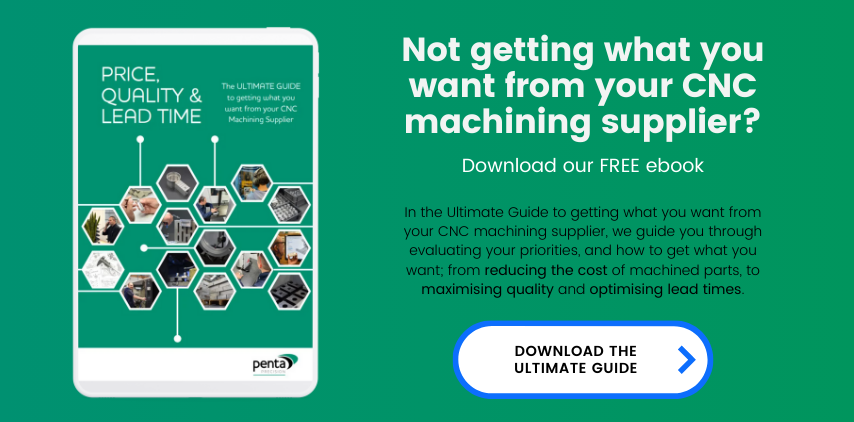Titanium Grade 2 Machined Parts
Your guide to Titanium Grade 2 Machining
__________
Commercially pure unalloyed titanium
Good corrosion resistance
High strength to weight ratio
Titanium is one of the strongest materials available as well as having high corrosion and heat resistance. It’s also exceptionally light weight, making it a perfect choice for applications where a high strength to low weight ratio is required.
This guide will take you through the main attributes, common applications, notes for designers and suitable finishing and treatments, as well as UK stock sizes and property tables. Don't forget to bookmark the page so you can refer back later.
If you are interested in titanium grade 2 machined parts, please scroll to the bottom of the page for more information about our service and to request a quote.
Grade 2 Guide: Properties, Applications and Design Considerations
__________
What is Grade 2 Titanium?
Grade 2, also known as the ‘workhorse’, is the most commonly used commercially pure unalloyed titanium and offers an excellent balance between strength and ductility. Comparing it to other grades of commercially pure titanium, it is slightly weaker than Grade 3, stronger than Grade 1 and equally corrosion resistant. It’s widely used in oil and gas, aerospace, marine and medical industries amongst others.
Titanium Grade 2 Machinability
Titanium grade 2 has good machinability compared to other titanium alloys, but it is still considered to be a difficult material to machine. It has a tendency to work-harden, which can lead to tool wear and breakage. Slow speeds, high feed rates and high coolant flow are required. Our engineering team here at Penta are very experienced in machining titanium and know which cutters and settings to use to get the best out of the material.
Similar or obsolete designation, material specifications and trade names
You may also see Grade 2 referred to as:
50A (UNS R50400), ASTM B265, ASTM B337, ASTM B381, ASTM F67, AMS 4941, ASTM B338, ASTM B348 (2), ASTM F468 (2), AMS 4902 , AMS 4942, ASTM B348, ASTM F467 (Ti-2), MIL T-9047, ASTM F67 (2), DIN 3.7035, MIL T-9046
Industry Examples: Oil & gas | Marine | Offshore | Chemical | Automotive | Food processing | Pharmaceutical | Medical | Biomedical | Aerospace | General engineering | Power generation
Typical Components & Applications: Heat exchangers | Pumps | Valves | Condensers | Medical equipment | Reaction vessels | Architectural components | Gears | Sprockets | Piping systems
Main Attributes:
- High corrosion resistance
- Lightweight
- Good impact strength
- High strength-to-weight ratio
- Wide availability
- Good machinability compared to other titanium alloys
- Low modulus of elasticity
- High biocompatibility
- Non-magnetic and non-toxic
- Good ductility
- Good weldability
- Good formability
- Resistance to high temperature and erosion
- Non-toxic and non-allergenic
- Resistance to chlorine and iodine environments
Notes for Designers:
Titanium is considered to be a difficult material to machine and tool wear is high compared to other materials. Therefore it’s recommended that titanium is only used where its properties are needed for the application – largely its strength per unit mass. If pure strength is the primary requirement, stainless steel might be a better fit.
It is worth noting that small pockets will be expensive to machine because it would require specialist cutting tools. When titanium is being machined, the tool absorbs heat so it needs good clearance to allow for cooling. A general rule is that a tool used for machining titanium should be no more than 70% of the diameter of the pocket. This extra expense needs to be factored in to a project with small pockets.
Finishing & Treatments:
Titanium is suitable for several different treatments. Anodising and specifically sulphuric anodising can improve strength by increasing the thickness of the oxide layer. Anodising can also be used to change the colour of the metal.
See our Finishing Processes page for further information on services that we can facilitate.
Can we meet your titanium Grade 2 machining needs? Contact us now
Grade 2 Titanium Machined Parts
__________
Penta Precision provides the following Grade 2 machining services:
- CNC milling
- CNC turning
- Prototypes and batch runs
- Insert installation
- Part marking
- Manual milling
- Manual turning
- Machining design advice
- Design for manufacture service
Want to know more?
__________
Find out how we can help you
![]()
Industry Sectors
EXPLORE
![]()
Commitment To Quality
EXPLORE
Get In Touch
__________

